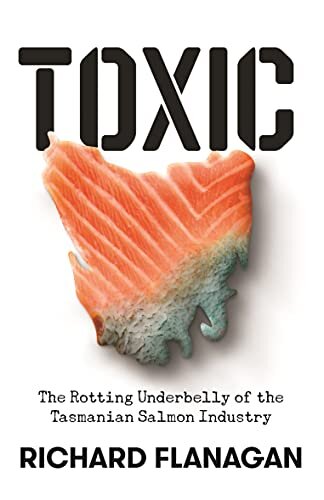Mass die-offs of captive salmon, slime-covered formerly pristine marine environments, feckless governments, and communities apparently powerless to stop greed trumping rationality. These were just some of the issues that Richard Flanagan raised in his book Toxic: The Rotting Undebelly of the Tasmanian Salmon Industry. Yes, this is the same Richard Flanagan who is more famous for his novels but this examination of the Tasmanian salmon industry comes from his heart with a full cohort of references to show it is more than an emotional tirade.
One of the most shocking themes in this book was that none of these travesties were hidden. He did not have to conduct clandestine raids into salmon farms to gather this information. For the most part his facts were in the public domain, only a few came from sources wishing to remain anonymous. One example of what was already publicly known was his account of a local council going bankrupt trying to pay for a fresh water system for a commercial salmon farm. The coucils’s willing rush to impending doom beggared belief but the story was fully referenced.
The book was very depressing in its account of the destruction unleashed on pristine marine environments, such as Macquarie Harbour, which became the site for thousands of salmon dying from oxygen starvation. In that case, the worst part of the story was that credible, independent scientific reports that were not for or against the industry detailed the issues that would arise. The government ignored the reports and barely punished the companies over the destruction.
In this book, Flanagan rightly criticised the Tasmanian government, of both Labour and Liberal for their unwillingness or inability to control the industry. To me, this was the best part of the book because he was not criticising them based on ideology, rather he showed through researched economics and job numbers why the governments’ support of this industry was wrong. He also traced the history of this support from when Tasmania was desperate for jobs so it embraced salmon farming as a possible solution. This support never wavered over the decades and even now, as new techniques for land farming of salmon threaten the industry, which will happily walk away from Tasmania to the mainland in a quest for lower costs, the government still covers for them. This unquestioning loyalty meant that the government refused to hold the salmon companies to account and nobody else with authority seemed to ensure the companies maintained the few weak standards that there were.
Bizarrely, the World Wildlife Fund (WWF), an organisation that should have been calling out these companies over the destruction of the marine environment had made a Faustian pact with at least one company. The named company annually purchased the use of the WWF’s logo for about $250 000 a year in a move to assure consumers of the company’s ‘green’ credentials. However, that same company has knowingly harmed marine mammals, destroyed the marine environment and possibly led to the demise of an endangered fish species. While the WWF does good work elsewhere these corporate deals seemed to create a silence when it came to the companies paying the bills.
Was all this pain worth it for the mass produced salmon? No. Because Flanagan showed that these manufactured fish have less Omega-3 and what existed was countered by increased fat content. The colouration was a dye that was potentially harmful to humans. The feed for these fish was no longer natural but was the by-waster of chicken farms. We are what we eat and the salmon from Tasmania is toxic.
The book was a work inspired by the personal experience of Flanagan seeing the destruction of the habitat around his cherished writing shack on the island of Bruny. The shack had been his retreat where he went to craft so many of his books but the salmon industry denuded the sea of much of its life while bombarding the island with the ceaseless human sounds of industrial scale fishing. This was the personal trigger that set Flanagan writing this book, unfortunately he found his story was replicated around Tasmania and he has recorded a lot of that misery in his book. Not surprisingly, the book has stirred controversy, with a brief Google search showing where some may dispute his claims. However, may be the fact that I did a Google search was part of what Flanagan wanted, he wanted people to care enough to read more about the issue and to form their own view.
